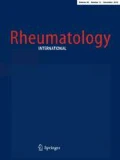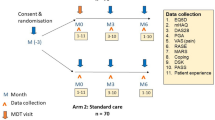Abstract
Objective: To determine whether therapeutic education added to conventional drug therapy reduced disability and pain in patients with early rheumatoid arthritis (RA). Methods: Fourty-three patients with RA, 29F/14 M, were included in a randomized, controlled trial and assigned to a control group receiving conventional pharmacological treatment only (n=21), or an intervention group receiving therapeutic education added to conventional pharmacological treatment (n=22). The main outcome variable was self-reported disability on the Stanford health assessment questionnaire (HAQ). Results: At 18 months, patients in the intervention group had less disability (HAQ), pain intensity, number of tender and swollen joints, and patient’s and physician’s global assessments (p=0.003, 0.031, 0.003, 0.001, 0.014, and 0.004, respectively) compared with baseline, and improvements in disability and number of tender and swollen joints (p=0.024, 0.040, and 0.003, respectively), compared with controls. Conclusions: Patients receiving pharmacological treatment and therapeutic education had a better evolution than those receiving only pharmacological treatment.

Similar content being viewed by others
References
Palferman TG (2003) Principles of rheumatoid arthritis control. J Rheumatol 67(Suppl):10–13
Holman H, Lorig K (2004) Patient self-management: a key to effectiveness and efficiency in care of chronic disease. Public Health Rep 119:239–243
Superio-Cabuslay E, Ward MM, Lorig KR (1996) Patient education interventions in osteoarthritis and rheumatoid arthritis: a meta-analytic comparison with non-steroidal anti-inflammatory drug treatment. Arthritis Care Res 9:292–301
Scott DL, van Riel PL, van der Heijde D, Benke AS (1993) Assessing disease activity in rheumatoid arthritis: the EULAR handbook of standard methods
Centers for Disease Control and Prevention (2000) Health-related quality of life among adults with arthritis—behavioural risk factor surveillance system, 11 states, 1996–1998. MMWR Morb Mortal Wkly Rep 49:366–369
Fries JF, Spitz PW, Young DY (1982) The dimensions of health outcomes: the health assessment questionnaire, disability and pain scales. J Rheumatol 9:789–793
Núñez M, Núñez E, Quintó Ll, Yoldi C, Muñoz J (1998) A program to improve the quality of life of chronic rheumatic patients. Models of teaching. Br J Rheumatol 37:19
Arnett FC, Edworthy SM, Bloch DA, McShane DJ, Fries JF, Cooper NS, et al (1988) The American Rheumatism Association 1987 revised criteria for the classification of rheumatoid arthritis. Arthritis Rheum 31:315–324
Núñez M (2001) La calidad de vida como objetivo: Nuevo modelo de asistencia a los pacientes reumáticos crónicos. Tesis Doctoral, Universidad de Barcelona, Barcelona
Bandura A (1997) Self-efficacy: towards a unifying theory of behaviour change. Psychol Rev 84:191–215
Kanfer FH, Gaelick L (1989) Self-management methods. In: Kanfer, Golstein AP (eds) Helping people change: a textbook of methods, 3rd edn. Pergamon Press, NY
Brokfield SD (1987) Developing critical thinkers: challenging adults to explore alternative ways of thinking and acting. Jossey-Bass Publishers, San Francisco
Crow ML (1980) Teaching as an interactive process. In Improving teaching styles. Jossey-Bass Inc., San Francisco
Muñoz-Gómez J, Núñez M (1991) Atlas de reeducación para enfermos reumáticos. Ediciones CEA, Madrid
Bonwell CC, Eison JA (1991) Active learning: creating excitement in the classroom. George Washington University, Washington, DC
Esteve-Vives J, Batlle-Gualda E, Reig A (1993) Spanish version of the Health Assessment Questionnaire: reliability, validity and transcultural equivalency. Grupo para la Adaptación del HAQ a la Población Española. J Rheumatol 20:2116–2122
Felson DT, Anderson JJ, Boers M, Bombardier C, Furst D, Goldsmith C, et al (1995) American College of Rheumatology. Preliminary definition of improvement in rheumatoid arthritis. Arthritis Rheum 38:727–735
Pinals RS, Masi AT, Larsen RA (1981) Preliminary criteria for clinical remission in rheumatoid arthritis. Arthritis Rheum 24:1308–1315
Taal E, Rasker JJ, Weigman O (1997) Group education for rheumatoid arthritis patients. Semin Arthritis Rheum 26:805–816
Lorig K, Konkol L, González V (1987) Arthritis patient education: a review of the literatura. Patient Educ Couns 10:207–252
Lindroth Y, Brattstrom M, Bellman I, Ekestaf G, Olofsson Y, Strombeck B, et al (1997) A problem-based education program for patients with rheumatoid arthritis: evaluation after three and twelve months. Arthritis Care Res 10:325–332
Riemsma RP, Kirwan JR, Taal E, Rasker JJ (2003) Patient education for adults with rheumatoid arthritis. Cochrane Database Syst Rev 2:CD003688
Keefe FJ, Van Horn Y (1993) Cognitive-behavioral treatment of rheumatoid arthritis pain: maintaining treatment gains. Arthritis Care Res 6:213–222
Scholten C, Brodowicz T, Graninger W, Gardavsky I, Pils K, Pesau B, et al (1999) Persistent functional and social benefit 5 years after a multidisciplinary arthritis training program. Arch Phys Med Rehabil 80:1282–1287
Helliwell PS, O´Hara M, Holdsworth J, Hesselden A, King T, Evans P (1999) A 12-month randomized controlled trial of patient education on radiographic changes and quality of life in early rheumatoid arthritis. Rheumatology 38:303–308
American College of Rheumatology Special Report (1994) Arthritis and musculoskeletal patient standards. Arthritis Care Res 7:1–4
Newman S, Steed L, Mulligan K (2004) Self-management interventions for chronic illness. Lancet 364:1523–1537
Hill J, Bird H, Johnson S (2001) Effect of patient education on adherence to drug treatment for rheumatoid arthritis: a randomised controlled trial. Ann Rheum Dis 60:869–875
Hill J (1997) A practical guide to patient education and information giving. Baillieres Clin Rheumatol 11:109–127
Acknowledgements
We wish to thank F. Segura, R. Cervera, and D. Buss for their help and advice.
Author information
Authors and Affiliations
Corresponding author
Rights and permissions
About this article
Cite this article
Núñez, M., Núñez, E., Yoldi, C. et al. Health-related quality of life in rheumatoid arthritis: therapeutic education plus pharmacological treatment versus pharmacological treatment only. Rheumatol Int 26, 752–757 (2006). https://doi.org/10.1007/s00296-005-0071-6
Received:
Accepted:
Published:
Issue Date:
DOI: https://doi.org/10.1007/s00296-005-0071-6



